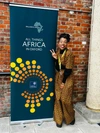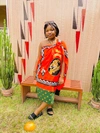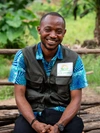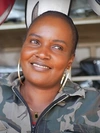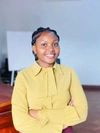Mantate Q. Mlotshwa
Young Girls Can Lead
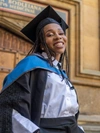
I grew up in a high-density suburb called Nkulumane, in Bulawayo, Zimbabwe, raised by my grandmother while my mother worked as a domestic worker in South Africa. I call myself a girl from Nkulumane because it defines a lot of who I am. In my neighborhood, it was common for grandmothers to raise the children because of the massive migration to South Africa and Botswana. The community was tight knit, your journey wasn’t yours alone but belonged to everyone. Elders in my hood celebrated the achievements of children. If I did something big, I’d have people cheering me on. I was a confident child and a natural leader from a young age; my grandmother always encouraged that in me.
After finishing primary school at Sigombe, I moved to a secondary school in the city, Eveline Girls High School. It was a big change! I was now in a school where we were required to speak English all day or risk punishment. I was surrounded by kids who came from primary schools we regarded as better. It was a new world, and while challenging at first, it was a world I knew I was cut out for. I immersed myself in extracurricular activities. I’ve always loved talking and sharing ideas, so things like debate, public speaking, and girl empowerment movements helped me use my voice and express my confidence in this new environment.
In my second year of secondary school, a sponsor came forward to pay my school fees for the year, as I was a well-performing student. Unfortunately, that support fell through and we were left with a bill after all. While it was a setback, it did not stop me. Around the same time, I entered a national competition focused on the United Nations’ development goals. I chose to work on the goal of gender equality and wrote about two women leaders I admired. One of them became the first female Vice President of our country, and another was the debate club president, head girl and the girl whose achievements introduced the turquoise blazer at my school. To my amazement, I won third place in Zimbabwe for that essay and got to travel to the capital, Harare. I was the only junior student in the competition which was for advanced-level students. It was my first time winning such a major honour. I remember proudly accepting the prize, which included a digital camera. More importantly, that experience opened my eyes to a world of possibilities and introduced me to renowned people in Zimbabwe’s creative sector.

By the time I was in senior high school, I was eager to take on more leadership. I even campaigned and was elected to be a junior parliamentarian when I was in fifth form. That experience especially of seeing how few girls were in those leadership spaces reminded me how limited opportunities could be for young women. It strengthened my resolve to show up in every space I found myself in and make sure girls like me had a voice. I began working with civil society organisations (CSOs) while still in school, bringing them in to support events and causes I cared about. I would plan junior parliament events and then literally walk into local NGO offices to pitch my ideas and invite their partnership. Thanks to this bold approach, I managed to host events without needing a big budget. I found people and organisations willing to help.
In one of the debate competitions I participated in, I qualified to represent Zimbabwe at the Impact Africa Debate Championship in Benin, West Africa. It was my first time on an airplane to another country, and I was both nervous and excited. That trip was a turning point: not only did I participate in an international debate and win the Best Speaker title, but I also discovered a new level of independence and leadership in myself. Travelling to a new country at a young age taught me that I could step into any space and find my voice there. It was an empowering lesson in finding myself as a leader wherever I go.
As my involvement with youth advocacy grew, I started travelling a lot for conferences across Africa. I built a bit of a reputation for mobilizing young people, and I even organised my own youth conferences to bring people together to discuss issues and solutions. This helped me build a brand among young activists, and various organisations began inviting me to take part in their initiatives. One of the most pivotal moments was when I attended a Generation Democracy Conference in South Africa. I was one of the youngest delegates there, and each country had to make a presentation. My friend Nalenhle Moyo and I were assigned the Zimbabwe presentation, and we wanted to make a statement. We planned an unforgettable presentation. We took a simple laundry bag and cut tiny holes in it just for her eyes, wrote the different challenges faced by youth all over the bag, and wrapped our country’s flag around her, while I stood on the podium. For us, it meant that young Zimbabweans have the agency and vision of where they want to go, but there was so much holding them back. The visual of her peering out from that laundry bag was striking, and the message resonated. The organisers loved it, and I think it was hard to ignore people like us in events after that.

Building on that momentum, I continued to expand my impact. In 2022, I was selected to serve on a global advisory board for youth and took on the role of a global communications officer. This role saw me travelling to different countries and continents, leading training on how young people can use social media to tell their stories and advocate for change, as well as the ways media can be used intentionally in times of conflict. I remember a meeting in Washington, D.C., where youth leaders from around the world gathered to design solutions for issues affecting young people. One project I contributed to was a human rights crisis response initiative: we identified young people from different regions of the continent, identified an ongoing crisis in a select country, and had them step into the shoes of critical players and model solutions. It was an incredibly busy year, but a fulfilling one. I gained a lot of visibility for our cause on social media and even got to contribute a case study about our program to a European conference.

My work with CSOs and international organisations didn’t just allow me to grow as a leader; it also became economically rewarding enough that I could support my grandmother and my mother could quit being a domestic worker. I am grateful for every opportunity to travel, meet new people, and share our story on a global stage. I’ve spoken in many places about the journey of young African women like me who are transforming their communities.
Being a young girl growing up in the hood, I want to help young girls know they can lead. That has been my driving force from Nkulumane to everywhere my journey has taken me. I’ve seen how a supportive community and a lot of determination can nurture leaders. My dream is to continue creating opportunities for young women and girls to realise their potential and to show them that their background should never limit how far they can go.
